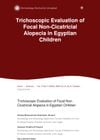 October 2024 in “Dermatology Practical & Conceptual”
October 2024 in “Dermatology Practical & Conceptual” Using dermoscopy improves diagnosis of scalp and hair disorders in children.
 September 2022 in “International journal of infectious diseases”
September 2022 in “International journal of infectious diseases” A woman with a rare scalp infection was cured after one month of medication.
December 2021 in “Acta dermato-venereologica” A deep learning model accurately predicts male hair loss types using scalp images.
 33 citations,
September 2012 in “Australasian Journal of Dermatology”
33 citations,
September 2012 in “Australasian Journal of Dermatology” Chemotherapy can cause hair changes similar to alopecia areata, which might lead to misdiagnosis.
 96 citations,
January 2013 in “International Journal of Trichology”
96 citations,
January 2013 in “International Journal of Trichology” Trichoscopy is a useful, non-invasive way to diagnose different types of hair loss.
 55 citations,
October 1992 in “Archives of Dermatology”
55 citations,
October 1992 in “Archives of Dermatology” Loose Anagen Hair Syndrome is a hereditary condition causing hair loss in children due to abnormal hair follicles.
 36 citations,
August 2018 in “Dermatologic Clinics”
36 citations,
August 2018 in “Dermatologic Clinics” Trichoscopy is a useful tool for diagnosing hair disorders without pulling out hair.
 30 citations,
April 2009 in “Dermatologic Surgery”
30 citations,
April 2009 in “Dermatologic Surgery” TrichoScan helps identify subtle hair thinning in women with androgenetic alopecia.
 17 citations,
January 2015 in “Current problems in dermatology”
17 citations,
January 2015 in “Current problems in dermatology” Understanding and treating hair disorders in different ethnic groups requires knowledge of specific hair care practices and hair characteristics.
 6 citations,
July 2022 in “World journal of stem cells”
6 citations,
July 2022 in “World journal of stem cells” Using extracellular vesicles from stem cells can help hair grow by affecting scalp cells and hair follicles.
 3 citations,
October 2021 in “Journal of Cosmetic Dermatology”
3 citations,
October 2021 in “Journal of Cosmetic Dermatology” Trichoscopy helps tell apart Frontal Fibrosing Alopecia and Lichen planopilaris by showing different hair and scalp features.
 1 citations,
October 2021 in “Clinical, Cosmetic and Investigational Dermatology”
1 citations,
October 2021 in “Clinical, Cosmetic and Investigational Dermatology” Vitamin B3 may help prevent hair loss and promote hair growth by protecting scalp cells from stress and reducing hair growth-blocking proteins.
1 citations,
October 2018 in “Ukraïnsʹkij žurnal dermatologìï, venerologìï, kosmetologìï” Wolvit® (biotin 5 mg) is effective and safe for treating hair loss and scalp conditions in women.
 April 2021 in “Journal of Investigative Dermatology”
April 2021 in “Journal of Investigative Dermatology” Leontopodium alpinum extract may help reduce hair shedding by keeping hair in the growth phase longer.
 July 2013 in “Our Dermatology Online”
July 2013 in “Our Dermatology Online” Oral methylprednisolone pulse therapy helped an 11-year-old regrow 80% of his hair in six months.
April 2012 in “Journal of evolution of medical and dental sciences” No effective treatment exists to stimulate hair growth in atrichia with papular lesions.
 November 1998 in “Journal of The European Academy of Dermatology and Venereology”
November 1998 in “Journal of The European Academy of Dermatology and Venereology” A man's skin cancer improved and some of his hair grew back after treatment with a special light therapy and a medication.
 92 citations,
June 2005 in “Journal of Investigative Dermatology”
92 citations,
June 2005 in “Journal of Investigative Dermatology” All-trans retinoic acid causes hair loss by increasing TGF-β2 in hair follicle cells.
 46 citations,
May 2012 in “Molecular and Cellular Endocrinology”
46 citations,
May 2012 in “Molecular and Cellular Endocrinology” Human skin produces sex hormones like estrogen and testosterone, influenced by ARO and StAR, which may affect skin elasticity and hair growth.
 31 citations,
August 2005 in “The American Journal of Dermatopathology”
31 citations,
August 2005 in “The American Journal of Dermatopathology” The study concluded that PKP1 is essential for skin integrity and hair growth, and its dysfunction causes the symptoms of ectodermal dysplasia/skin fragility syndrome.
 19 citations,
January 2012 in “International Journal of Trichology”
19 citations,
January 2012 in “International Journal of Trichology” Propionibacterium acnes might be linked to hair casts and possibly alopecia.
 12 citations,
August 2000 in “Fertility and Sterility”
12 citations,
August 2000 in “Fertility and Sterility” Topical finasteride doesn't reduce DHT levels, hinting at an endocrine role in hair loss.
 7 citations,
November 2013 in “Pediatric and Developmental Pathology”
7 citations,
November 2013 in “Pediatric and Developmental Pathology” Over half of the children had abnormal hair under a microscope, with many having genetic hair conditions.
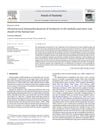 7 citations,
December 2011 in “Annals of anatomy”
7 citations,
December 2011 in “Annals of anatomy” Involucrin helps strengthen the inner parts of human hair.
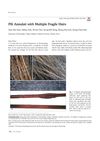 4 citations,
January 2017 in “Annals of Dermatology”
4 citations,
January 2017 in “Annals of Dermatology” Frequent hairdryer use may worsen hair fragility in people with Pili Annulati.
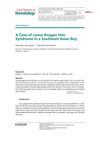 1 citations,
July 2019 in “Case reports in dermatology”
1 citations,
July 2019 in “Case reports in dermatology” A Thai boy was diagnosed with a rare hair disorder causing hair thinning and shedding.
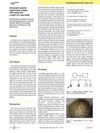 1 citations,
August 2011 in “Dermatology Reports”
1 citations,
August 2011 in “Dermatology Reports” Two siblings were found to have a genetic condition causing progressive hair loss and woolly hair, which may often be misdiagnosed.
 September 2022 in “Research Square (Research Square)”
September 2022 in “Research Square (Research Square)” Hydrocolloid wound dressings emit energy that can affect human hair follicle metabolism.
 September 2017 in “Pediatric Dermatology”
September 2017 in “Pediatric Dermatology” A 14-year-old boy was diagnosed with a rare hair condition that may lead to hair thinning and has no known effective treatments.

A new peptide, murikal/SPR4, was found to significantly increase hair growth in mice, and its liposomal topical formulations enhanced hair growth more than commercial products. However, results on human scalp skin were unclear, needing more tests.



























